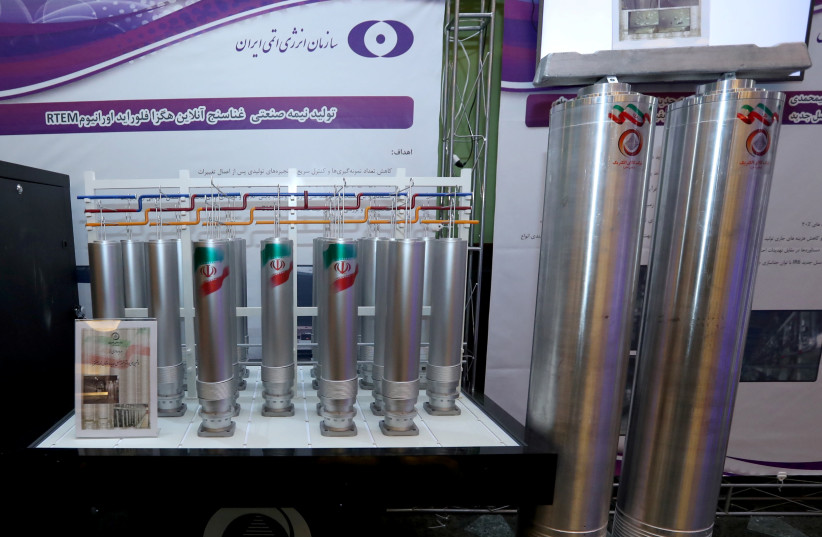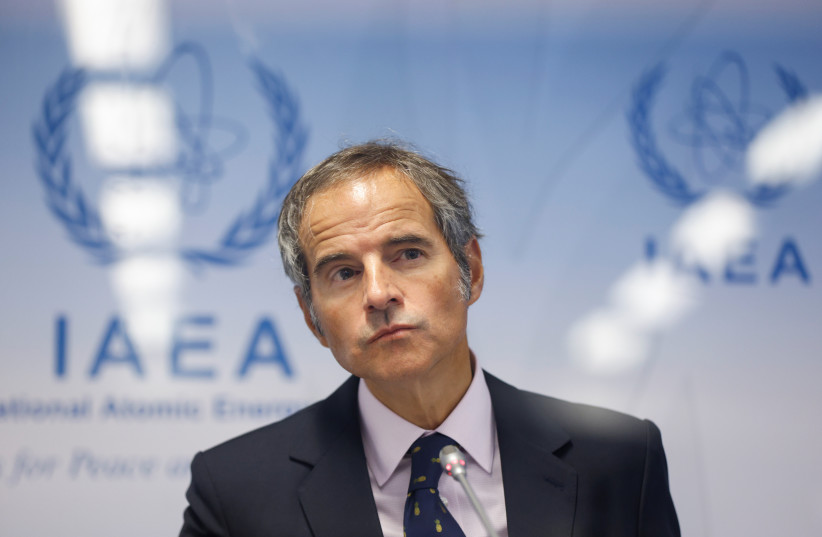“The West is concerned that the NPT…will fail and a domino effect will begin as countries withdraw from the treaty.”

Iran should withdraw from the Treaty on the Non-Proliferation of Nuclear Weapons (NPT), an article on the front page of the Iranian Kayhan newspaper, affiliated with Iranian Supreme Leader Ali Khamenei, urged on Tuesday.
The article cited the stalling of talks on a return to the JCPOA nuclear talks, a wave of pressure on Iran, the continued reluctance of the US to lift sanctions, and recent reports by the International Atomic Energy Agency (IAEA) against Iran as a reason for Iran to withdraw from the NPT, calling such a move the “minimum solution for [Iran’s] diplomatic apparatus.”
“Withdrawal from the NPT as high-pressure leverage could be a strong response to the US and European approach to the Islamic Republic of Iran’s nuclear activities,” read the Kayhan article. “The West is concerned that the NPT – a treaty whose general spirit is to contain non-nuclear-weapon states – will fail and a domino effect will begin as countries withdraw from the treaty.”
The article added that withdrawal from the non-proliferation treaty “has more benefits than membership,” and that Iran could withdraw from the NPT by activating Article 10 of the treaty, which allows a party to leave if it determines that “extraordinary events, related to the subject matter of this Treaty, have jeopardized the supreme interests of its country.”
If it decides to withdraw, Iran would have to give notice to the other parties to the NPT, as well as to the United Nations Security Council, three months in advance.

The Kayhan article complained that the IAEA had become “a political tool for the United States and Europe with false reports and coordination with the criminal Zionist regime.”
Hossein Shariatmadari, the managing editor of Kayhan, claimed to the Iranian Fars News Agency on Monday that the West’s dispute with Iran is not about the Islamic Republic’s alleged moves towards a nuclear weapon.
Shariatmadari complained that the former Iranian government led by then president Hassan Rouhani opposed proposals to withdraw from the NPT, saying that “unfortunately [the proposal] was abandoned very soon.”
The Kayhan editor pointed out that Israel is not a member of the NPT, claiming that Israel was provided with nuclear weapons by the US, France and Britain, although Israel denies owning any nuclear weapons.
“The IAEA is silent about all the countries that have officially and openly violated the provisions of the NPT, and has focused all its efforts on Iran, which it knows does not seek to develop nuclear weapons, and under the pretext of inspections, it obtains the latest military information and details of our country’s scientists and provides it to the enemies of Iran with pictures for sabotage in nuclear and military facilities and assassination of our country’s scientists!” said Shariatmadari to Fars.
“All the evidence suggests that the nuclear challenge is just an excuse, and the only way forward for us to get that excuse out of the hands of the enemy is to use Article 10 of the NPT and withdraw from the treaty,” added the Kayhan editor.
Support growing in Iran for anti-nuke fatwa to be revoked
A fatwa (Islamic religious decree) listed on Khamenei’s official English-language website states that “the Islamic Republic of Iran considers the use of nuclear, chemical and similar weapons as a great and unforgivable sin. We proposed the idea of ‘Middle East free of nuclear weapons’ and we are committed to it. This does not mean forgoing our right to peaceful use of nuclear power and production of nuclear fuel.”
Former Iranian diplomat Amir Mousavi told Al-Mayadeen TV on Monday that there is a growing call in Iran for Khamenei to reconsider his fatwa against the use of nuclear weapons, warning that the fatwa may be seen as a “weakness” and may be a “basis” for assassinations and other attacks against Iran.
Last year, Mousavi stated that “A fatwa is not permanent, according to the Ja’afari Shi’ite jurisprudence. A fatwa is issued in accordance with developing circumstances. Therefore, I believe that if the Americans and Zionists act in a dangerous manner, the fatwa might be changed,” according to MEMRI.
Despite Khamenei’s fatwa, in April former Iranian MP Ali Motahari stated “from the very beginning” Iran had begun nuclear activity with the goal to “build a bomb and strengthen the deterrent forces.” Motahari added that Iran “could not maintain the secrecy of this issue, and the secret reports were revealed by a group of hypocrites,” seemingly leading to the plan being abandoned.
“If we, like Pakistan, could secretly make and test bombs, it would be very deterrent,” Motahari stated. “When we started something, we should have seen it to the end.”
Motahari has commented in the past that Tehran can still make a nuclear bomb, despite Khamenei’s fatwa against such weapons, because the fatwa only forbids the use of a bomb, not the creation of one.
Draft resolution against Iran submitted to IAEA board
The United States, Britain, Germany and France have submitted to the UN nuclear watchdog’s board a draft resolution criticizing Iran for not fully answering the watchdog’s questions on uranium traces at undeclared sites, a move that is likely to anger Iran.
Several diplomats said the resolution was likely to pass easily despite warnings by Iran of retaliation and consequences that could further undermine already stalled talks on rescuing the 2015 Iran nuclear deal. Iran’s ally Russia opposes such a resolution.
IAEA Director-General Rafael Grossi stated on Monday that Iran is going to cross the uranium enrichment threshold needed to create a nuclear bomb, stressing that this “cannot be avoided.” Grossi has lamented in recent weeks that Iran has failed to provide credible explanations about the IAEA’s findings at three undeclared locations in the country, including traces of nuclear material.
Content retrieved from: https://www.jpost.com/middle-east/iran-news/article-708823.